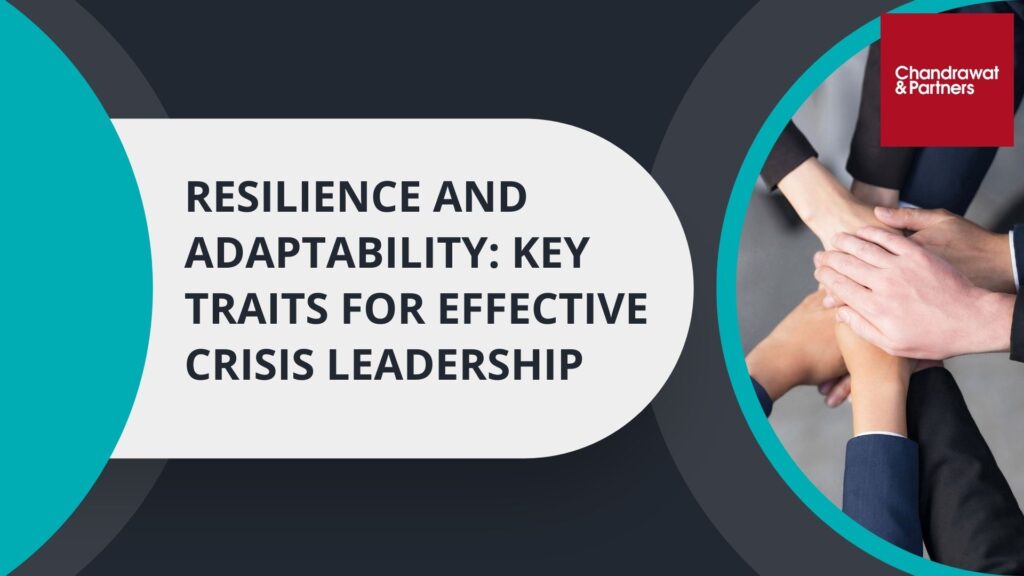Edit Content
Edit Content
Edit Content

In interconnected world, crises can transcend borders that impact communities, organizations, and nations on a global scale. Effective crisis leadership is essential in navigating complex challenges and guiding individuals and institutions towards resilience and recovery. Resilience and adaptability are two key traits that enable leaders to respond effectively to crises, regardless of geographical boundaries. It is important to explore the significance of resilience and adaptability in crisis leadership, with a global perspective.
From natural disasters and pandemics to geopolitical conflicts and economic downturns, global crises demand leaders who can navigate through complexity, uncertainty, and cultural diversity. Countries explore the multifaceted dimensions of global crises and the role of leadership in shaping effective responses. Global crises are characterized by complex and rapidly changing dynamics. Leaders must navigate through ambiguous situations, make decisions based on incomplete information, and anticipate future challenges. They must be comfortable with uncertainty and capable of adapting their strategies as new information emerges. These may include natural disasters, pandemics, economic recessions, geopolitical conflicts, cyber threats, and environmental crises, among others. Global crises are characterized by their complexity, interconnectedness, and the potential for cascading effects across regions and sectors. Leaders must recognize that the impacts of global crises transcend national borders and require collaboration and coordination at an international level.
Resilience is the human capacity to meet adversity, setbacks and trauma, and then recover from them in order to live life fully. Resilient leaders have the ability to sustain their energy level under pressure, to cope with disruptive changes and adapt. Resilience forms the foundation of effective crisis leadership. Resilience is a crucial characteristic of high-performing leaders. Leaders must cultivate it in themselves in order to advance and thrive. They also carry the responsibility for helping to protect the energy of the people in their teams. Leadership is sustainable only if individuals and teams are able to consistently recover high energy levels.
Adaptability is paramount in addressing the ever-changing dynamics of global crises. Today, no industry or company is safe from disruption, but many organizations are not prepared to adapt quickly enough to survive accelerating change. For companies to position themselves for long-term success in this shifting environment, business leaders must prioritize adaptability as a crucial organizational trait. Businesses can no longer rely on traditional measures of business fitness. They must change their perspective and transform quickly and at scale to become adaptable today to survive tomorrow. Global complexity refers to the intricate and interconnected nature of crises that span multiple countries, systems, and stakeholders.
Global crises are influenced by a myriad of factors, including cultural, political, economic, and environmental dimensions. Leaders must comprehend and navigate this complexity to effectively address the root causes, consequences, and interdependencies of global crises. Global crises are often characterized by uncertainty and rapidly changing circumstances. Leaders who can adapt their decision-making processes and approaches in real-time are better equipped to respond effectively to emerging challenges.
Leading in a global context requires cultural intelligence—a deep understanding and appreciation of diverse cultures, values, and norms. Businesses explore the importance of cultural intelligence in crisis leadership and provide frameworks for enhancing cross-cultural competence. By leveraging cultural intelligence, leaders can build trust, communicate effectively, and navigate through cultural complexities when responding to global crises. Cultural intelligence, also known as cultural quotient (“CQ”), refers to an individual’s ability to interact and work effectively with people from different cultural backgrounds. It involves being aware of one’s own cultural biases, possessing knowledge about other cultures, and being able to adapt one’s behaviour to accommodate cultural differences. Cultural intelligence goes beyond mere cultural awareness and requires a genuine understanding and appreciation of diverse perspectives.
Global crises often require collaborative efforts and partnerships. Global alliances bring together organizations and individuals with varied expertise and perspectives. Collaborative leaders leverage the collective knowledge to generate comprehensive insights, identify emerging trends, and develop effective strategies in crisis management. By pooling together diverse perspectives, knowledge, and capabilities, collaborative leaders can generate innovative solutions, optimize resource allocation, and mobilize support on a global scale. Collaboration enables a coordinated and comprehensive response by reducing duplication of efforts and maximizing the impact of interventions.
Resilience and adaptability are critical traits for effective crisis leadership in a globalized world. By embracing these traits and understanding their relevance across cultural contexts, leaders can navigate through global crises with agility and empathy. Cultivating resilience, fostering adaptability, developing cultural intelligence, and embracing collaborative leadership empower leaders to address global challenges, build resilient communities, and foster sustainable solutions. As leaders embody these key traits, they not only inspire the teams but also drive positive change on a global scale, ensuring a more resilient and interconnected world in the face of crises.
For more information or queries, please email us at
[email protected]

Managing Partner
Copyright © Chandrawat & Partners. All Rights Reserved.
Copyright © Chandrawat & Partners. All Rights Reserved.

Chandrawat & Partners stands as a dynamic and rapidly expanding full-service firm, specializing in the delivery of exceptional professional and corporate services to a diverse clientele, both foreign and local. We proudly represent companies and individuals across a wide spectrum of sectors through distinct entities established in various countries worldwide.
ASIA
AFRICA
EUROPE
NORTH AMERICA
SOUTH AMERICA
OCEANIA
Chandrawat & Partners uses cookies to run our site and improve its usability.
By using our site you agree to our use of Cookies.